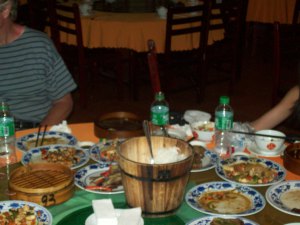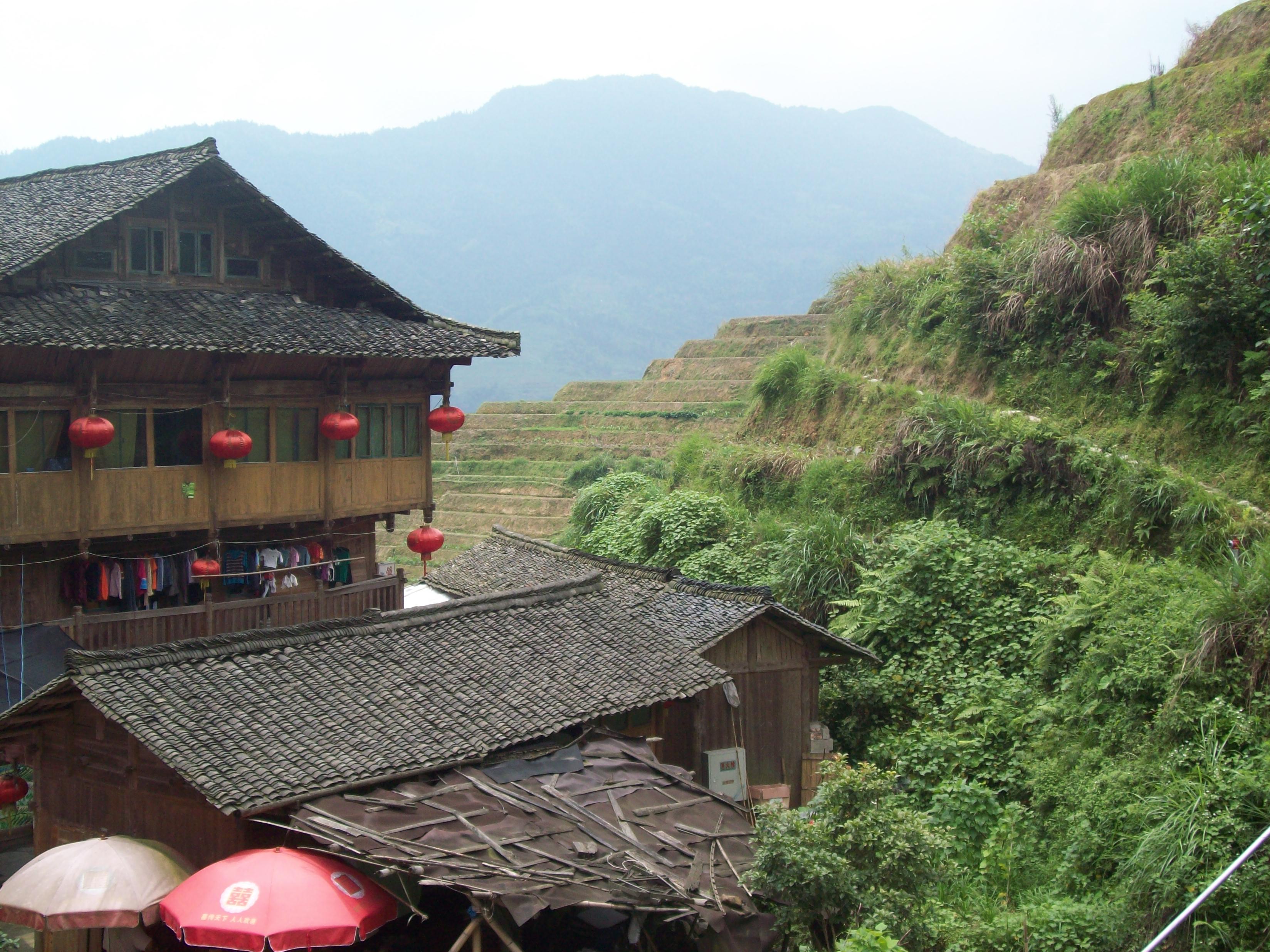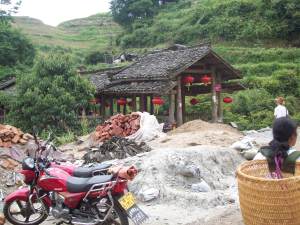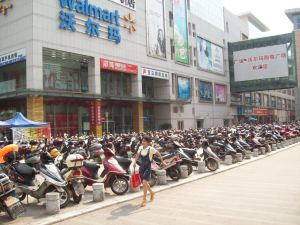At Cloud 9 cooking school in Yangshuo, the first thing we do is meet our classmates, who come from Nevada, Great Britain, Germany, and New Zealand. They all speak English. This is our first encounter with English speakers in days, and I’m so overjoyed I don’t care what we cook. We choose dishes, then troop off to the market to buy the ingredients.
This is a real market, very different from the Wal-Mart where Chinese people go to hang out in the entertainment section. This is where natives do their real day-to-day shopping. Right inside the door, the floor is crowded with bowls of live creatures. Eels swimming in water, frogs hopping up and down inside their net bags. Across the warehouse-sized room are table after table of squash and cucumbers and tomatoes and carrots and eggplants. Our instructor leads us up and down aisles, giving little lectures about selected vegetables. I’m talking to one of the women from Nevada instead of paying attention. Sophie frowns at me.
The instructor warns us that in the meat section, there will be dogs. “They are one kind of dog,” she says. “We do not eat pets.” Sophie and a couple of the women decline to go. I have this weird disability that keeps me from recognizing and processing unfamiliar visual stimuli, which means that in the seventh grade when we watched “Wheels of Tragedy,” a gruesome cautionary film about reckless driving, I had no idea what was going on. My classmates were horrified and grossed out by the blood and guts splattered on the highway. I dozed through what seemed to me abstract patterns. So I feel safe entering the butcher shop.
Unfortunately, I don’t have an olfactory disability, and the smell of blood is overwhelming. We pass tables of animals in various stages of slaughter as well as cages of flapping chickens and quacking ducks. There are no cages of whimpering puppies, although later everyone else says they saw a dog being butchered. Slabs of meat hang from hooks. A trip through a Chinese butcher shop could drive many Americans to vegetarianism, but most shoppers whisk through matter-of-factly. There are no hidden realities about what they are having for dinner.

By the time we get back to the restaurant, we are all slick with sweat; it’s at least 100 degrees, and it feels like we could wring buckets of sweat out of our hair. We proceed up to our classroom where somehow all of our ingredients have been prepared and placed on shelves beneath our cooking stations.
First, we chop eggplant into strings and put it in a bowl of salty water to get rid of the bitter flavor. We cut the seeds out of red and green peppers and cucumbers and shred them into strips. We squish some garlic and ginger under our knives and then mince it, cut carrots and chicken breasts into cubes, and hack spring onions into half-inch pieces. Whenever we have handled meat, we line up outside and wash our hands. Then we wipe down our cutting boards with the tissue under the sink—so this is where all the toilet paper in China has disappeared to.
The instructor proceeds at lightning speed, making few allowances for the thirteen-year-old in the room, much less for those of us who are cooking dunces. She does occasionally reach over to help out Sophie, who is keeping up pretty well. I hasten to follow along, since sometimes I can barely hear the instructor over the kitchen noise.
We open our baggies of dumpling dough, trace water around the edges, fill them, and seal them. Everyone else twists theirs into fancy shapes. Mine are awkward little pillows. We place them in bamboo steamers and send them to the kitchen to be steamed. Then, in the sweltering heat, we turn on our woks and put in oil, stir fry the eggplant, take it out, fry the garlic, add corn starch, spring onion, pepper and sesame oil. One plate down, one to go.

We switch to clean woks to stir fry our chicken, but Sophie is shorter than the rest of us, right in the line of fire of spitting oil, and she gets hit below the eye. It burns so painfully that she leaves to splash water on it. By the time I enlist the instructor to cover our stations so I can follow her, the guy from Stuttgart, who turns out to be a medical student, has things under control. He asks for a clean cloth. The women who work in the kitchen offer some aloe from a plant on the sill, but the medical student says we’ll start with ice.
Someone brings up some ice. Once we’ve established that Sophie’s eye is OK, I find myself eyeing that ice with envy. It’s the first time I’ve seen ice in China. We can’t have it in restaurants because there’s no way to ensure that it was made with boiled water.

By the time Sophie’s eye feels better, our classmates are marching out, bearing plates of Gung Bao Chicken and Braised Eggplant. Our dumplings meet us downstairs. I’m too tired and hot to be hungry, too drained to properly enjoy a table full of English speakers from all over the world. I drink my lukewarm water and dream of ice cubes, and when we get back
to our apartment, it occurs to me to check the miniature freezer compartment in our tiny refrigerator, where I find a dollhouse-sized ice cube tray. I’m not sure if I’ll ever remember how to make Gung Bao Chicken, braised eggplant, or dumplings again, but we make some mean ice cubes.





